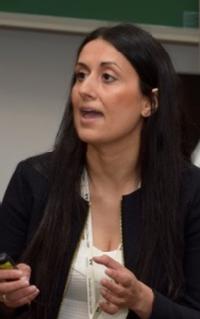WATE 2019 Winner: Georgia Kremmyda (Engineering)
Why did you start teaching? What (or who) inspired you?
As a student I was lucky to have many passionate teachers that instilled to me a thirst for knowledge and a passion for engineering a better world. I feel that with my teaching I can equally make an impact to the future careers and aspirations of young engineers!
What pearls of wisdom have you been given over the years that have helped you with your teaching?
I believe that over the years I have sourced lots of wisdom and experience that formed me the teacher that I am today. It is all the bits and pieces that I have collected and implemented to my teaching style from being an assertive teacher to staying firm at the same time, having clear objectives but allowing flexibility, being friendly but at the same time maintaining my credibility as a teacher.
Is there anything you wish someone had told you when you started out?
Yes, I think in my first year of teaching I was quite naïve on what to expect. I wish someone had told me that there are a lot of things about teaching that you just won’t learn until you are really in the thick of it!
If you were mentoring a first-time teacher, what advice would you give?
You are not simply the ‘giver of knowledge’; you are also the ‘facilitator of experiences’.
Try to direct the students’ learning in authentic and relevant ways.
Every student has the potential to do great things; you as a teacher are a catalyst to unlock their potentials.
What advice/top tips would you give to more experienced teachers?
Having taught for a number of years, I have placed the weight of my teaching onto establishing fruitful and prosperous teacher-student relationships. This may seem too obvious but my experience has shown that this has a great impact on students’ learning and development!
What new technologies are you currently using to enhance your teaching? What are your top tips for using them?
I am using the technologies that most of the Warwick academics are using in their teaching such as lecture capture, classroom response systems, virtual learning, videos, podcasts, blogs, wikis and game-based learning.
What new or future teaching innovations are you looking forward to?
I am looking to implement more opportunities for experiential learning into my teaching. I have recently delivered a field course on campus where students had to build bamboo shelters, simulating real-life conditions in a resource-restrained environment.
What does winning a WATE award mean to you?
It means recognition of my hard work, passion and enthusiasm on my teaching. At the same time it is a motivation to work harder and inspire more students and colleagues, if possible!
What do you enjoy the most about teaching? What’s the best part of your job?
Seeing my students achieve their best and succeed in the classroom and beyond!
Best part of my job is being with my students in the classroom.
What are the biggest challenges faced by teaching staff? How do you overcome these?
I think teaching staff are facing three main challenges which are: balancing the different learning needs of students; respecting students’ expectations; helping students meet long-term goals. I personally overcome these by being flexible and keeping effective communication with my students.
What lessons have you learned from your students?
From my students I have learnt that ‘simple is best’. Early in my teaching career, I used to teach in ways that were either too complex or sophisticated, not allowing creativity and imagination to thrive. Now I know that simple is best…
If you could write a recipe for the perfect inspiring teacher, what ingredients would you need?
Georgia’s perfect teaching recipe:
- Tip your students (ingredients) into the classroom. Mix them together for 5 minutes until you get a flexible and elastic dough.
- Keep your dough warm and quiet for 35 minutes or until it doubles in noise and activity while you are gradually adding your yeast with plenty of exciting lecture slides, explanations and visual aids.
- Lightly flour your dough for 10 minutes with questions and answers to shape it.
- Let your dough sit for a couple of days.
- Repeat 1 to 4 about 15-30 times over a period of 10 weeks.
- Heat the oven to 4 hot questions and put your dough in. Gently bake your dough for 3 hours.
- Once cooked your dough should feel light and fluffy.
- Leave to cool completely before serving your bake with butter and jam (marks).
Enjoyed hearing from David? See the full list of 2019 winners and read other interviews.

